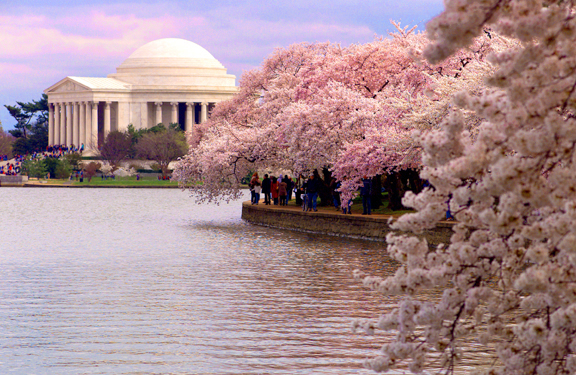I'm starting to explore Sydney and its Down Under September spring. Walking back along Glebe Pt. Road, passing a perfect little garden with a cherry tree in bloom, I was hit with one of those confusing waves of joy and pain... The cool air and classic crisp blossoms woke up the ghosts of all the homes I've made and had to leave, for one reason for another -- Waimea, Palo Alto, Kyoto, Iowa City, New York, Maui, and even dusty old Beijing, welling with cherry-white around Wuminghu (No-name Lake) after an ice-bound winter. The pain sparked anger and, as if I were speaking to the entire road, entire city, entire country of Australia, and the entire damned planet, I found myself thinking, "Don't you dare. Don't you dare make me want you. Don't you dare seduce me with light and spring flowers and good cafes and quirky little bookstores, the kind that have been sucked from most cities like spiderwebs into a vacuum cleaner. Not again."

At one of the spiderweb bookstores I'd picked up a used copy of Suite Française and let myself be lost in wonder at Irène Némirovsky, long after everyone else has exclaimed over the resurrection of her handwritten manuscript left behind in a suitcase. I'm looking at her photo -- a delicate, soulful-looking Russian-Jewish French Catholic convert, a successful novelist controversially accused of playing along with French anti-Semitism. Fleeing Paris with her family in 1940, she resettled at the edge of the occupied zone. Knowing that the defeated French were betraying her and themselves, she began to write about it with appalling clarity and tenderness, both maternal and erotic. She wrote in her notebook, "My God! What is this country doing to me? Since it is rejecting me, let us consider it coldly, let us watch as it loses its honour and its life." Yet when she writes of village life in occupied France, we are somewhere in between Swan's Way and the Cephallonia of Captain Corelli's Mandolin. We know before we begin to read that she died in Auschwitz, this devoted mother who wrote with shocking, almost unbearable intimacy about the seductive discipline, perfected physicality and intermittent sentimentality of the German occupiers. In her deft portraits, the coldly arrogant French aesthetes and aristocrats, two-faced pious bourgeoise and sly villagers often suffer by comparison to their conquerors. Following the ruthless gods of death-for-empire, the German soldiers love children and music with otherworldly naiveté, and want to be liked.
Just before a passage describing the Germans patrolling a road posted with the sign "Keep out under penalty of death," Némirovsky writes of a cherry tree blooming beside that verboten road. Japanese obsessions with the evanescent beauty and sadness of cherry blossoms are well known, and Némirovsky's exquisite lines may be influenced by the Japonaiserie of an earlier era, a literary echo of Van Gogh's cherry trees: "The sun shone through them, revealing a pattern of interlacing, delicate blue veins, visible through opaque petals; this added something alive to the flower's fragility, to its ethereal quality, something almost human, in the way that human can mean frailty and endurance at the same time."
With a rustle of this terribly frailty, the cherry tree on Glebe Pt. Road reopened once again my awareness that there is no demarcation line in this war in which we find ourselves. Everywhere is occupied, everywhere is the front line. Water, air, land, sea -- all species are at risk of losing our homes, and we who are able to make choices are both the aggressors and the defenders in this pivotal battle. What do we even call it? It changes hourly -- anthropogenic climate change, the war of ideologies, the clash of civilizations, continual economic crisis, partisan politics, the battle for hearts and minds and above all dollars, the dependence on new sources of fear and desire to keep the engines running.
The war I'm especially attuned to is humans vs. ecosystems. Ever since we could talk (or perhaps pee -- the first symbolic language was probably territory-marking), we've expressed mixed feelings. The mixed feelings I experience when captured by the renewable beauty of flowers are as natural as the flowers themselves. "Why should I fall in love, get attached? I'll just have to leave, sooner or later..." Interwoven in all enchantment is suffering and impermanence, and this realization is at the foundation of Buddhist teachings.
Like any animal, we try to make things more comfortable and interesting, and yes, we tend to go overboard pretty quickly, getting bored and greedy. But it also seems just a bit unfair, doesn't it? Wow -- fifty years (give or take a few centuries) of trying to feed and entertain everyone (well, okay, mostly ourselves), and invent means of easy mobility and communication (plus megatons of other less-benign stuff), and boom, the planet throws a fit. Is this really a new battle, or the same old one -- survival vs. serious doubts about the whole damn thing? Both the beauty and the ugliness seem to be trying to tell us something.